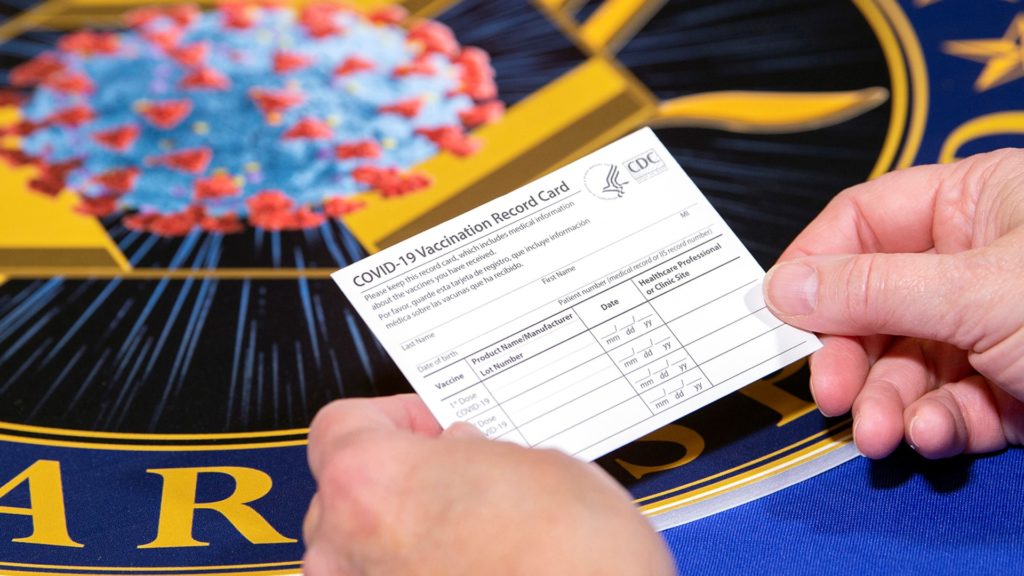A CNN report on the Department of Defense’s aggressive plan for distributing COVID-19 vaccines included a photo of a little-known aspect: the vaccination card.
According to the report, vaccination cards are intended to be the “simplest” way to keep track of COVID-19 shots for a vaccine that requires multiple doses.
“For most COVID-19 vaccine products, two doses of vaccine, separated by 21 or 28 days, will be needed,” according to the Centers for Disease Control and Prevention. “Second-dose reminders for vaccine recipients will be critical to ensure compliance with vaccine dosing intervals and achieve optimal vaccine effectiveness.”

Every dose administered will be reported to the CDC, said Claire Hannan, executive director of the Association of Immunization Managers. And vaccination clinics will also keep a record of who got what dose, so that way you’re not getting the second dose of a vaccine before you got the first.
Not to mention that every shot will be tracked by state and local health departments, too.
In Virginia, for example, state officials said people who get the vaccine will be put into a registry. “It’s just a reminder they need to come back for a second dose. It’s going to help us know what shot you got and which one you need,” said Dr. Ryan Light with the Tidewater Physicians Multispecialty Group.
In Kentucky, Public Health Commissioner Dr. Steven Stack explained to state residents that receiving the vaccine would put them on the National Immuno Registry. “The federal government is going to provide vaccination cards that we will provide for people when they get a vaccine,” Stack said. “I don’t want to minimize this. This, and other parts of this, are just parts of what makes this a complex undertaking.”
Reminding people they need to come back for a second shot is innocuous. But will governments really limit this data’s use to a calendar entry? And what about private businesses? Or will they use it to sort non-card-carrying citizens as part of a public health strategy?
It’s not a new idea. In March, New York Gov. Andrew Cuomo (D) proposed a reopening strategy for his state that included antibody testing results. “Younger people can go back to work… people who can get this antibody test — show they have had the virus and resolved — can go back to work,” Cuomo said.
A few weeks later, America’s COVID czar Dr. Anthony Fauci said he was open to the idea as well: “It’s one of those things that we talk about when we want to make sure that we know who the vulnerable people are and not,” he said.
Supporters of this approach argue it’s an efficient way to balance public health concerns with reopening the economy — for some. “Just as the work of licensed truckers benefits those unable to drive, the increased safety and economic activity enabled by immunity licenses would benefit the unlicensed,” wrote Ezekiel Emmanuel, one of the health experts behind Obamacare.
Opponents fear it could lead to what Noah Rothman of Commentary Magazine calls an “Immunity Caste” system. “Establishing infection as the criterion to reengage in economic activity would create some rather perverse incentives for individuals to become infected,” Rothman notes.
In many states, restaurants are already required to collect the names and contact information of their dine-in customers and make it available to health departments as part of contact tracing efforts. Why not demand to see their vaccination papers as well? If private businesses know potential employees or customers have vaccination cards in their wallets, will it be “No Shirt, No Shoes, No Shots — No Service?”
In May, electronic health records company EPIC said it was looking into developing a phone app that will say “whether you are tested and you’re clear, whether you are currently not safe, whether you have COVID right now.” According to CEO Judy Faulkner, the app would show red for someone who has COVID-19, green for someone who’s clear and yellow if the status is unknown.
“There needs to be legislation barring private interests from using this [vaccination cards] to de facto stratify society,” says Rothman. “And it needs to be done now.”

